

Win-win game. A win-win game is a game which is designed in a way that all participants can profit from it in one way or the other.
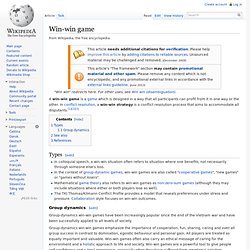
In conflict resolution, a win-win strategy is a conflict resolution process that aims to accommodate all disputants.[1][2][3] Types[edit] In colloquial speech, a win-win situation often refers to situation where one benefits, not necessarily through someone else's loss.In the context of group-dynamic games, win-win games are also called "cooperative games", "new games" or "games without losers".Mathematical game theory also refers to win-win games as non-zero-sum games (although they may include situations where either or both players lose as well).The TKI Thomas/Kilmann Conflict Profile provides a model that reveals preferences under stress and pressure.
Collaboration style focuses on win-win outcomes. Cooperation. Among humans[edit] Language allows humans to cooperate on a very large scale.
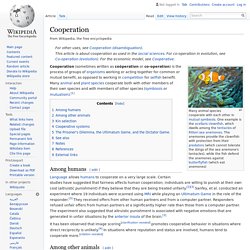
Certain studies have suggested that fairness affects human cooperation; individuals are willing to punish at their own cost (altruistic punishment) if they believe that they are being treated unfairly.[2][3] Sanfey, et al. conducted an experiment where 19 individuals were scanned using MRI while playing an Ultimatum Game in the role of the responder.[3] They received offers from other human partners and from a computer partner. Responders refused unfair offers from human partners at a significantly higher rate than those from a computer partner. The experiment also suggested that altruistic punishment is associated with negative emotions that are generated in unfair situations by the anterior insula of the brain.[3] Among other animals[edit] Competition Win-Lose. Competition in sports.

A selection of images showing some of the sporting events that are classed as athletics competitions. Consequences[edit] Competition can have both beneficial and detrimental effects. Many evolutionary biologists view inter-species and intra-species competition as the driving force of adaptation, and ultimately of evolution. However, some biologists, most famously Richard Dawkins, prefer to think of evolution in terms of competition between single genes, which have the welfare of the organism 'in mind' only insofar as that welfare furthers their own selfish drives for replication. Conciliation. Conciliation is an alternative dispute resolution (ADR) process whereby the parties to a dispute use a conciliator, who meets with the parties separately in an attempt to resolve their differences.
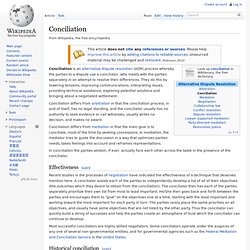
Avoidance Lose-Lose. From Wikipedia, the free encyclopedia Avoidance may refer to:
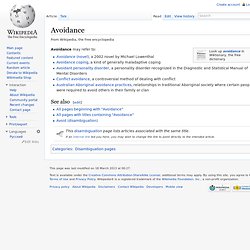
U.S. Institute for Environmental Conflict Resolution. Saltman Center for Conflict Resolution. Conflict Resolution Quarterly. Consortium on Negotiation and Conflict Resolution — Consortium on Negotiation and Conflict Resolution — Georgia State University. Restorative Justice Project Cited FairnessWorks.com editor Ken Kimsey urged readers this week to explore and submit entries to WhatIsRestorativeJustice.org, an online database project led by Carolyn Benne as part of CNCR.
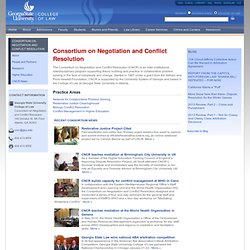
More » CNCR teaches mediation at Birmingham City University in UK As a member of the Higher Education Funding Council of England’s Improving Dispute Resolution Project, Jill Scott attended CNCR’s Summer Institute and immediately saw the benefits of mediation in her role as Equality and Diversity Advisor at Birmingham City University, UK. More » University - ILR School: Scheinman Institute on Conflict Resolution.
Conflict Resolution Network. Conflict Resolution Skills: Turning Conflicts into Opportunities. Understanding conflict in relationships Conflict arises from differences, both large and small.

It occurs whenever people disagree over their values, motivations, perceptions, ideas, or desires. Conflict Resolution Network. Journal of Conflict Resolution. Center for Conflict Resolution. Conflict Resolution. Conflict Resolution: Daniel Dana: 0639785323600: Amazon.com. Portland State University Department of Conflict Resolution. The Conflict Resolution Graduate Program offers either a Master of Arts or Master of Sciences degree.

Both degrees draw from and contribute to theories and insights in the field, as well as preparing students for professional work. The program currently offers the following areas of concentration: Theory and Practice Peace and JusticeInternational and Intercultural Conflict Resolution Students entering this program are expected to develop an understanding and appreciation of the theoretical, conceptual, and methodological breadth of the field. Students are also encouraged to broaden the scope of their studies by pursuing their own particular interests in the study of conflict resolution and integrating their life experiences and ideas into their studies. Student and advisor work together to design an individualized program based upon each student's particular interests in the field of conflict resolution. If you'd like more information about the program, please see the Admissions section.
Win-Win / Win-Lose / Lose-Lose Situations. The Basics Win-win, win-lose, and lose-lose are game theory terms that refer to the possible outcomes of a game or dispute involving two sides, and more importantly, how each side perceives their outcome relative to their standing before the game.
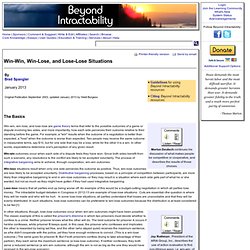
For example, a "win" results when the outcome of a negotiation is better than expected, a "loss" when the outcome is worse than expected. Two people may receive the same outcome in measurable terms, say $10, but for one side that may be a loss, while for the other it is a win. In other words, expectations determine one's perception of any given result. Beyond Intractability. Collective intentionality. Collective intentionality demonstrated in a human formation.
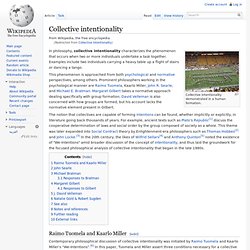
In philosophy, collective intentionality characterizes the phenomenon that occurs when two or more individuals undertake a task together. Examples include two individuals carrying a heavy table up a flight of stairs or dancing a tango. This phenomenon is approached from both psychological and normative perspectives, among others. Prominent philosophers working in the psychological manner are Raimo Tuomela, Kaarlo Miller, John R. Collective Responsibility. First published Mon Aug 8, 2005; substantive revision Mon Jun 14, 2010 The notion of collective responsibility, like that of personal responsibility and shared responsibility, refers to both the causal responsibility of moral agents for harm in the world and the blameworthiness that we ascribe to them for having caused such harm.
Hence, it is, like its two more purely individualistic counterparts, almost always a notion of moral, rather than purely causal, responsibility. But, unlike its two more purely individualistic counterparts, it does not associate either causal responsibility or blameworthiness with discrete individuals or locate the source of moral responsibility in the free will of individual moral agents. Instead, it associates both causal responsibility and blameworthiness with groups and locates the source of moral responsibility in the collective actions taken by these groups understood as collectives. 1.
Self-confirming equilibrium. Consistent self-confirming equilibrium is a refinement of self-confirming equilibrium that further requires that each player correctly predicts play at all information sets that can be reached when the player's opponents, but not the player herself, deviate from their equilibrium strategies. Consistent self-confirming equilibrium is motivated by learning models in which players are occasionally matched with "crazy" opponents, so that even if they stick to their equilibrium strategy themselves, they eventually learn the distribution of play at all information sets that can be reached if their opponents deviate.
Shared Agency. 1. The traditional ontological problem and the Intention Thesis Agency is sometimes exercised in concert, as when we walk together, several individuals undertake painting a house, or a football team executes a pass play.[2] It is hardly controversial that there really is a phenomenon falling under labels such as shared activity, and joint or collective action. What is disputed is how to understand it. One way to approach the issues here is to ask what distinguishes actions of individuals that together constitute shared activity from those that amount to a mere aggregation of individual acts.
What is left over when we subtract what each of us did from what we did together? Collective intelligence. Types of collective intelligence Collective intelligence is shared or group intelligence that emerges from the collaboration, collective efforts, and competition of many individuals and appears in consensus decision making. The term appears in sociobiology, political science and in context of mass peer review and crowdsourcing applications. It may involve consensus, social capital and formalisms such as voting systems, social media and other means of quantifying mass activity.
Collective IQ is a measure of collective intelligence, although it is often used interchangeably with the term collective intelligence. Collective intelligence has also been attributed to bacteria[1] and animals.[2] Collective intelligence strongly contributes to the shift of knowledge and power from the individual to the collective. History[edit] Pareto efficiency. Pareto efficiency, or Pareto optimality, is a state of allocation of resources in which it is impossible to make any one individual better off without making at least one individual worse off. The term is named after Vilfredo Pareto (1848–1923), an Italian economist who used the concept in his studies of economic efficiency and income distribution. [citation needed] The concept has applications in academic fields such as economics and engineering. For example, suppose there are two consumers A & B and only one resource X. Suppose X is equal to 20.
Let us assume that the resource has to be distributed equally between A and B and thus can be distributed in the following way: (1,1), (2,2), (3,3), (4,4), (5,5), (6,6), (7,7), (8,8), (9,9), (10,10). Group mind (science fiction) A group mind, hive mind, mind coalescence or group ego in science fiction is a single, collective consciousness or intelligence occupying many bodies or entities. Its use in literature goes back at least as far as Olaf Stapledon's science fiction novel Last and First Men (1930).[1][2] A group mind might be formed by telepathy, by adding brain-to-brain communication to ordinary individuals, or by some unspecified means.
This term may be used interchangeably with "hive mind". A hive mind is a group mind with almost complete loss (or lack) of individual identity; most fictional group minds are hives. Nash equilibrium. In game theory, the Nash equilibrium is a solution concept of a non-cooperative game involving two or more players, in which each player is assumed to know the equilibrium strategies of the other players, and no player has anything to gain by changing only their own strategy.[1] If each player has chosen a strategy and no player can benefit by changing strategies while the other players keep theirs unchanged, then the current set of strategy choices and the corresponding payoffs constitutes a Nash equilibrium. The reality of the Nash equilibrium of a game can be tested using experimental economics method. Stated simply, Amy and Will are in Nash equilibrium if Amy is making the best decision she can, taking into account Will's decision while Will's decision remains unchanged, and Will is making the best decision he can, taking into account Amy's decision while Amy's decision remains unchanged.
Applications[edit] Conflict resolution. The term conflict resolution may also be used interchangeably with dispute resolution, where arbitration and litigation processes are critically involved. Group conflict. Search for Common Ground. Search for Common Ground (or SFCG) is an international non-profit organization operating in 30 countries whose mission is to transform the way the world deals with conflict away from adversarial approaches toward cooperative solutions. It is headquartered in Washington, D.C., with the majority of its 450 employees based in field offices around the world.
To date, SFCG has created independent radio programming, begun a newsletter which features articles on relations between the West and the Muslim world, and brought together numerous conflicting groups to find ways to peacefully resolve issues. John Marks, SFCG's founder and president, received an award in 2006 from the Skoll Foundation for social entrepreneurship.[1] In 2008 Search for Common Ground was awarded the Benjamin Franklin Award for Public Diplomacy by the U.S. Conflict transformation. Conflict resolution research.
Conflict continuum. Conflict continuum is a model or concept used by various social science researchers in modelling conflict, usually going from low "irritations" to high "explosiveness" intensity.[1] These conceptual models facilitate discussion as in "anywhere on the conflict continuum".[2][3] Double bind. Balance theory. P-O-X model[edit] For example: a Person (P) who likes an Other (O) person will be balanced by the same valence attitude on behalf of the other. Symbolically, P (+) > O and P < (+) O results in psychological balance. This can be extended to things (X) as well, thus introducing triadic relationships. If a person P likes object X but dislikes other person O, what does P feel upon learning that O created X? Confirmation bias. Self-evaluation maintenance theory.
Conflict resolution. Confrontation analysis. Metacognition. Conflict Resolution. Conflict Resolution - Resolving conflict rationally and effectively - Leadership training from MindTools. Conflict Resolution - Effective Conflict Resolution Techniques.
Game Theory. Game Theory. Game theory. Prisoner's Dilemma - Game Theory .net. Glossary of game theory. Confrontation analysis. Games, Dilemmas and Traps.